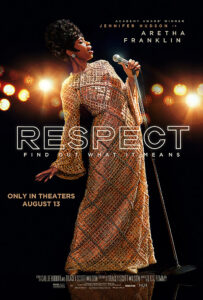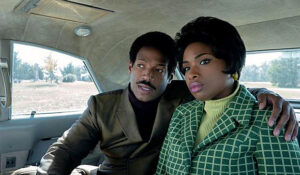 By Steve Crum
By Steve Crum
Some of my favorite movies are biographies. Make that MANY. I am talking Hollywoodized versions of a celebrity’s life. The musical bio is a particular fav sub-genre. Respect, the Aretha Franklin saga, is a comfortable fit. It’s pretty much cookie-cutter predictable. (Hey, we all know Aretha’s songs…and there are 18 of them sung here by Jennifer Hudson over the 145-minute running time.) So the bottom line is if you are an Aretha Franklin fan, you will love Respect. The musical sequences are great.
That said, fans and others will have to withstand some pretty grim realities of Aretha’s abusive upbringing and adult personal life. Regarding the latter, think of Tina Turner’s marriage to Ike…as depicted in 1993’s What’s Love Got to Do With It? Respect’s screenplay, by Tracy Scott Wilson, effectively punches literally and figuratively, yet leaves out some key facts—probably because they are just too shocking.
Opening in 1952 Detroit, 12 year-old “Reth” (played by Skye Dakota Turner) is awakened by her Baptist minister father to once again get out of bed to entertain the loud party in the living room, whereupon she is told to dazzle the crowd by her adult-like singing. (Reth/Aretha and her two sisters live with their dad, who is divorced from an alcoholic mom she truly misses and loves.) Tragically, Reth is raped during one of her father’s parties—in her own bedroom—and gives birth to her first son when she is 13.

What Wilson’s screenplay fails to mention is the same thing occurs again when she is 14, resulting in her second son. The double whammy is that her pious father, Rev. C. L. Franklin (Forest Whitaker), raped a friend’s 12 year-old as well. And she gave birth too. These episodes were conveniently edited out.
Reth’s life if further devastated when her mother, Barbara Siggers Franklin (Audra McDonald), suddenly dies. Now she has no one who understands her, and no adult to confide in. Her father is anything but sympathetic or personable.
As Reth grows older, with her own children being taken care of by her grandmother (?), she becomes  more active in her father’s church and political aspirations. Her father’s close friends become her’s, including Dr. Martin Luther King Jr. (Gilbert Glenn Brown).
more active in her father’s church and political aspirations. Her father’s close friends become her’s, including Dr. Martin Luther King Jr. (Gilbert Glenn Brown).
It is not surprising that much of these early sequences include gospel songs—obviously a major influence on Aretha Franklin’s singing style. Early on, dad C. L. began planning her career as a recording artist. He is her agent/manager. Surprisingly, at least to me, C. L. encourages Reth to sign with Columbia Records in NYC, and is introduced to the legendary jazz authority John Hammond. The moderately successful jazz records lead to several albums of pop standards. At this point Aretha is only doing cover material, and nothing original.
Aretha’s career then fluctuates until she breaks from her father’s supervision to old friend Ted White (Marlon Wayans), who establishes a  successful career with original songs. She is on her way up in show biz, guided by an aggressive and very physically abusive husband, Ted.
successful career with original songs. She is on her way up in show biz, guided by an aggressive and very physically abusive husband, Ted.
And so it goes with Respect, a sadly appropriate movie title which reflects both Aretha’s strife and one of her biggest songs.
Much more develops between Aretha and Ted, Aretha and C. L., Aretha and her sisters, and Aretha and her addictions. (Not much is said about her children, however.)
There are some surprisingly good performances by Marc Maron as record producer Jerry Wexler, and Tituss Burgess and gospel  singer/pianist/composer James Cleveland.
singer/pianist/composer James Cleveland.
While much of the script focuses on the recording studio and creative process, it is Jennifer Hudson’s treatment of Aretha Franklin’s songs that sparkles here. Hudson was the late Aretha’s personal choice to portray her.
A wise choice indeed.
GRADE on an A-F Scale: B
